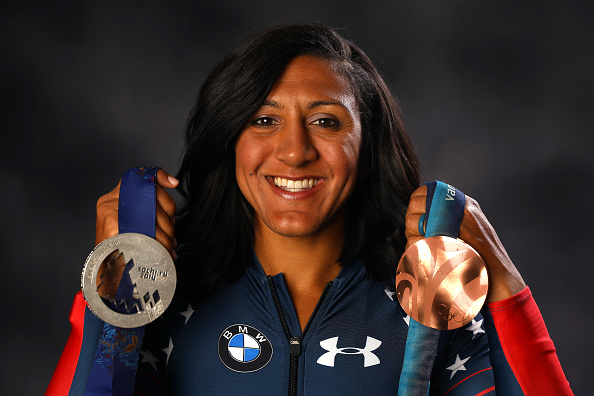Elana Meyers Taylor will be helping American bobsledders, and athletes in many other sports, long after her days as a driver are over.
The pilot of USA-1 has pledged her brain to the Concussion Legacy Foundation for research on concussions and chronic traumatic encephalopathy. She’s had four concussions that she knows of, including one that almost ended her career, and is all too aware that research on repetitive head trauma in female athletes is lacking.
“Women are largely unrepresented in brain donations. And concussions affect women more than men, so they need to get research out,” Meyers Taylor told USA TODAY.
Meyers Taylor told USA TODAY about her plans in November, but her pledge isn’t being announced by the Concussion Legacy Foundation until Tuesday. She started wearing the group’s logo on her helmet during the World Cup season.
Also on Tuesday, hockey gold medalists Angela Ruggeiro and Hayley Wickenheiser of Canada will announce they are pledging their brains.
“Head trauma is not part of the discussion in Olympic sports yet. It’s barely part of the global discussion,” said Chris Nowinski, co-founder and executive director of the Concussion Legacy Foundation. “So this is a great way to start the conversation in countries where it has yet to begin.”
Much of the focus on the effects of repetitive head trauma in athletes has been on football players, and understandably so. The damage is brutally evident in former players, whose autopsied brains have shown signs of CTE and whose loved ones tell of memory loss, changes in personality and depression before their deaths.
But football is hardly the only sport in which athletes take repeated blows to the head. Boxing, hockey, soccer. And, yes, bobsledding.
Watch a bobsled race, and you can see the sled bumping and shaking as it speeds along the icy track. The sled can reach speeds of up to 90 mph, and top-level tracks have more than a dozen turns.
“Anytime you hit a curve or you hit on the side of the wall, you hit against the side of the sled,” said Meyers Taylor, who won a silver as a driver in the Sochi Games and a bronze in Vancouver as a brakeman.
“We’re taking four to five, sometimes six or seven Gs on our body every time we go down the track,” Meyers Taylor said. “And then the crashing. We use motorcycle helmets. Motorcycle helmets are meant for one crash. … They’re made to prevent bad things from happening, and they do. But at the end of the day, who knows how much they can undergo in a bobsled?
“Bobsled is just a violent sport.”
Meyers Taylor experienced the worst of it in 2015, when a January crash left her disoriented. She felt better pretty quickly and passed an IMPACT concussion test “with flying colors.”
By the end of the season, however, her symptoms had returned. Light sensitivity. Headaches.
And, most profound, a change in her personality.
“A really big symptom of mine, that we didn’t realize (was a symptom), was emotional,” Meyers Taylor said. “I was not myself at all. I was acting out. And my husband was the one to really notice it because I’d take it out on him. If my emotions were out of control, he was the one who would see it.”
She was treated at Cerebrum Health Centers in Atlanta and thought she was OK. But when she began training that fall, her symptoms returned.
After the second World Cup race, her coaches told her they were sending her home.
“I just sat there crying to them and I was like, ‘I don’t know if I’ll be back,’” Meyers Taylor said. “I think that was the hardest thing for them, to see me in that moment because I didn’t know. I didn’t know what would happen, and it was just so hard to go through.”
She and her husband, fellow bobsledder Nic Taylor, returned to Atlanta, where she worked with a new team of doctors at Cerebrum. After three months, she was cleared. She’s been symptom-free since then.
But Meyers Taylor knows her experience is far from unique. Just last fall, in fact, fellow American Lolo Jones suffered a concussion that caused lingering symptoms.
So Meyers Taylor reached out to Nowinski’s group, wanting to do whatever she could to help.
It was a surprise — and welcome — email. Getting female athletes or their families to pledge their brains remains a challenge, Nowinski said.
Of the 2,800 brains that have been pledged, 549 are from female athletes.
“Females have been neglected in traumatic brain injury research. They’re almost non-existent in CTE research, and that’s something that needs to change,” Nowinski said. “We do know there are differences between a male brain and a female brain, so we’d expect there to be differences in how they respond to brain injuries.”
Meyers Taylor is quite possibly the biggest cheerleader the U.S. Olympic team has. (Seriously. Check out her Twitter feed.) But her support and care for her fellow Olympians extends far beyond the Pyeongchang Games.


